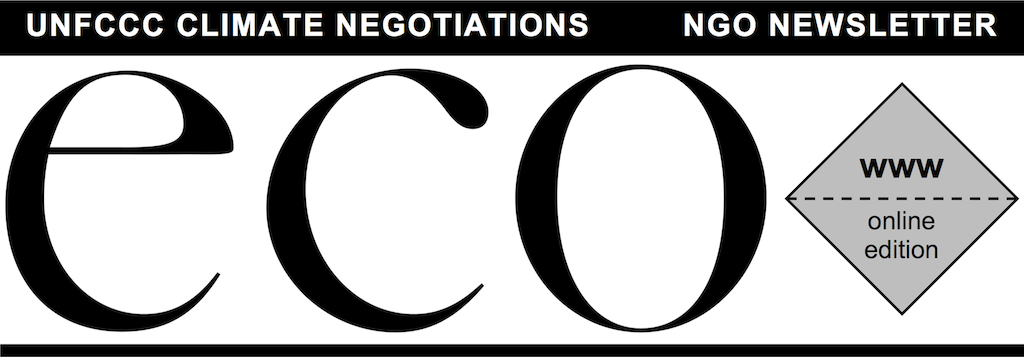Monthly Archive: November 2013
ADP: Get the Job Done
Last night, negotiators completed comments on the second version of the ADP co-chairs’ proposed decision text and draft conclusions. The co-chairs did a skillful job of focusing the discussion on paragraph-by-paragraph textual comments, with only the occasional excursion into recitation of well-known talking points.
It’s clear there are still sharp differences amongst Parties on several issues. The co-chairs’ task now is to capture compromises in the new version of their text this morning, and then try to resolve as many remaining differences as possible before sending their proposed decision and conclusions to the COP. That will leave Ministers with a handful of issues to address.
On the 2015 agreement, it’s essential that Parties agree here in Warsaw on next steps in the process, including beginning work on a draft negotiating text at the ADP’s next session in March in Bonn, and reaching agreement on the information that Parties should provide in their proposed post-2020 commitments no later than the second ADP session in June.
Those proposed commitments should be submitted by Parties in 2014 in order to enable a full and transparent review and allow for upward revisions in ambition by COP 21. The scope and focus of the review process should be agreed in advance of the submission date, so Parties know how their proposals will be judged against each other in terms of equity and fairness, as well as how far the aggregate gets to the 2°C goal.
... Read more ...
Finance COP – or Finance Flop?
Those who expected high-level guidance from the eagerly expected ministerial finance dialogue certainly did not get it.
There were a few notable exceptions: Adaptation Fund pledges, a few constructive interventions, and some stark reminders of what is at stake. But on the whole, it was a dull string of speeches devoid of content, much less actual offers of finance.
Yesterday, negotiators were stuck over the Green Climate Fund and whether it should run empty for another year. These decisions are political, and ECO suggests that ministers dip into their ambition reserves for that purpose.
Concerning the promise of finance increasing to US $100 billion a year by 2020, there are four concrete outcomes that would help pave the way:
* Increase trust in promises made.
* Increase finance for adaptation.
* Increase predictability.
* Increase political attention.
In the remaining hours, there is one last chance that a greatly strengthened effort on finance could restore the promise that this would be the Finance COP.![]()
Progressing the Adaptation Agenda
Negotiators made progress here in Warsaw on various adaptation issues. We have a decision on the next phase of the Nairobi Work Programme. Negotiators also worked hard on expanding the National Adaptation Plan process through technical and financial support.
It’s also good that the work of the Adaptation Committee was acknowledged, and we expect that enough resources will be provided to implement the 2014 work plan. But perhaps the next Annual Adaptation Forum could be less of a self-congratulatory talk-show.
Negotiators also worked hard on Loss and Damage. The establishment of an effective international mechanism would be a major accomplishment for Warsaw (but let’s remember ‘effective’).
There is welcome news of achieving the US $100 million fundraising goal for the Adaptation Fund. But it should not have been so difficult to achieve, given the pioneering work and effective performance of the AF.
Much more needs to be done to establish confidence that the $100 billion will be delivered by 2020, as public finance is required to trigger the necessary scale of action.
When Parties bring bold pledges to the climate summit in New York in September (let’s remember ‘bold’), this should include substantial money for the Green Climate Fund and other instruments allowing adaptation to be scaled up rapidly.
... Read more ...
Technology: A Good News Story
Yesterday UNEP Executive Director Achim Steiner declared with much relish that the Climate Technology Centre and Network (CTCN) will begin to accept requests from developing countries for support for technology transfer on December 9. The full operationalization of the Technology Mechanism now emerges as the good news story of COP 19.
But the question arises: does the submission of requests from developing countries make the Technology Mechanism truly fully operational? For those who can’t stand the suspense, here are some suggested enhancements.
Global Technology Action Plan: How will the TEC know that it has dug deep enough and focused on the right technologies? A Global Technology Action Plan (TAP) platform should be developed and implemented by 2015. It could offer portfolios of optimized plans and help assess technology choices and enablers. The platform would, in effect, translate emissions pathway scenarios into corresponding Technology Action Plans that countries could choose to implement.
Technology Assessment: The terms of reference of the TM describes the transfer of Environmentally Sound Technologies (ESTs), but it fails to describe exactly what “environmentally sound” means. This should not include radical and potentially dangerous solutions like extreme genetic engineering, massive biomass burning and carbon capture, or geoengineering technologies that are potentially threatening to the planet.
... Read more ...
Dear Japan:
Hello and welcome, Mr. Japanese Minister!
We would like to introduce ourselves, as we did not have a chance to meet you here in Warsaw.
We have met the Japanese ministers at every Conference of the Parties since COP 2, held in 1996. We are wondering why the honorable Minister of Japan did not have the time to meet us in civil society this time around, and explain Japan’s new ‘ambitious’ emissions target of 3.1% above 1990 levels by 2020 .
We are looking forward to meeting you in Lima, and hoping by then you can present a truly ambitious target of which you could be proud!![]()
Dear New Zealand:
We are hearing that the climate change minister feels a bit neglected. COP 19 is nearly over and not even one NZ fossil! Usually by now you could expect at least two or three. Quite frankly, it’s because no one could be bothered.
As the Minister is fond of pointing out, New Zealand is only a teeny tiny part of the world’s emissions. And so is NZ’s ambition. The 5% net unilateral target trumpeted by New Zealand in the plenary is weaker than business as usual.
When they seek a bilateral to ask for something, ECO wonders why anyone would bother. Because when it comes to tackling climate change, it sure doesn’t bother New Zealand.![]()
Fossil of the Day – Nov 21
The First Place Fossil goes to India for continuing to be a spoiler on equity at the ADP sessions. The previous fossil to India was for their push to get the only mention of equity in the text to be deleted. At yesterday’s late night ADP session, India once again spoke against equity opposing South Africa’s proposal on the Equity Reference Framework and wanting to cancel the workshop on equity at the upcoming ADP session in Bonn. We certainly expect more from a Party that showed promise of being an equity champion just two years ago in Durban, saying they could not see a future deal without equity embedded in it.![]()



